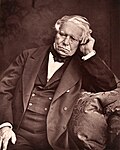History
Following the previous cabinet largely assembled by an agreement between royalists and moderate republicans that resulted in a coalition, Thiers asked Dufaure to reform a republican government without the support of the Legitimists and the Orléanists on 18 May 1873.
The goal was to pursue the reforms which Thiers had envisioned but that weren't previously possible; however, it placed the government in a minority in the National Assembly. Indeed, even after the complementary elections of 2 July 1871, which saw an increase of seats for the Opportunists and their Liberal allies, royalists still outnumbered them.
Most of the members of the preceding cabinet remained in office and only four new ministers were appointed. One particularity of the cabinet is the separation of the portfolio of Public Instruction and Worship into two distinct ministries, divisions which would be quickly erased during the following administrations. [1]
Thiers and Dufaure presented to the Assembly a project on the organization of the powers for the republic. This project was meant to bring bicameralism, the responsibility of the government to the parliament and the right of dissolution in the political system of France. [3]
On 24 May 1873 the vote on the project failed. A new vote, interpreted by Thiers as a vote of no confidence, was held in the National Assembly, carried out by the royalists now in opposition and in majority following their ousting of the previous government. It passed with a majority of sixteen and Adolphe Thiers resigned as a result. [4] Jules Dufaure tendered the cabinet's resignation after only a week, making it one of the shortest cabinets of the Third Republic. The newly elected President of the Republic Patrice de MacMahon accepted it on 25 May and proceeded to ask Albert de Broglie to form a new government, leading to the formation of the much more conservative Cabinet de Broglie I. [2]
This page is based on this
Wikipedia article Text is available under the
CC BY-SA 4.0 license; additional terms may apply.
Images, videos and audio are available under their respective licenses.


